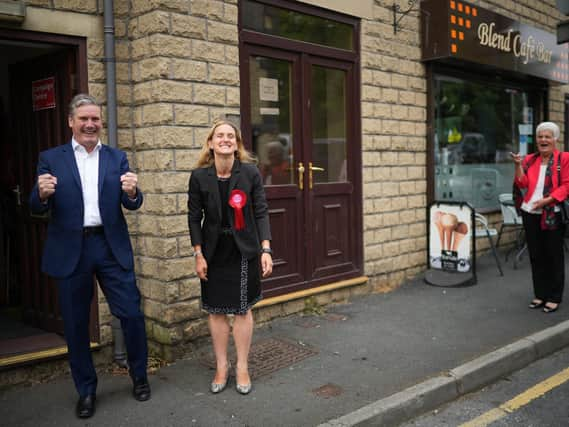Labour still has a long road ahead after Batley and Spen by-election - David Blunkett


This time last year, many of those commentating on the first lockdown were describing the common humanity and coming together of people facing adversity and helping each other out.
Some of that has undoubtedly continued to the present day. Street groups, often on WhatsApp, mutual support and good neighbourliness have not disappeared.
Advertisement
Hide AdAdvertisement
Hide AdMy warning in these columns then, was that we should not be overoptimistic about what would happen as the first flush of mutual self-help and applause for the NHS waned.
Generalisations don’t help. Millions of people are what they always were: kind, considerate and looking for what unites rather than divides. Yet, as we’ve seen in other parts of the world - most obviously the United States – deep-seated bitterness and resentment is not easily set aside. After all, 74 million people voted for Donald Trump last year, and many of them would do so again.
What we hold in common and unites us is reminiscent of the words of Jo Cox, the Labour MP for Batley and Spen, murdered two weeks before the referendum five years ago.
Her sister, Kim Leadbeater, carried Jo’s banner of hope and unity in the former mill towns during the bitterly fought by-election on 1 st July.
Advertisement
Hide AdAdvertisement
Hide AdA victory, as she put it, “for hope”. Hope over those who would use the lowest possible human frailty as a way of engineering whatever it was that drove George Galloway to make his second major appearance in West Yorkshire, having won a by-election in Bradford some years ago.
This latest campaign was marked by anti-Semitism, homophobia, division tactics and even the importing of the bitter divide over Kashmir. I’ve been to Azad Kashmir: I’ve experienced the best of human nature and the welcome of people in Mirpur, one of the towns most strongly linked to Yorkshire.
I am overwhelmed by sadness when I think that 8,200 people in communities where those of different faiths and backgrounds live together in peace voted for George Galloway. Yet do not misunderstand me. This is not just to do with Batley and Spen. This feeling of “us and them” spreads right across our country. Sometimes engineered by those in power, sometimes responded to by those fighting their own cultural wars in a way that plays into the hands of their political enemies. An ineptness which particularly infects our political dialogue.
A way in which even when we are rejoicing at something as simple as England beating Germany at Wembley sullies a moment of joy. A young family member was in a pub in North London, watching the match with scores of others, only to be horrified as the picture of a young German girl held by her father, wearing her country’s colours and weeping her heart out was caught on camera, and the reaction of virtually all those in the pub was to boo her.
Advertisement
Hide AdAdvertisement
Hide AdWhat sort of a nation have we become? What on earth is wrong with us? Everything now is a binary choice – for or against.
Turning town against city; those with an academic aptitude against those taking a vocational route; women versus men; and even, in the highest echelons of government, preferment by which way the politician jumped on the issue of Brexit.
So much benchmarked – not on the basis of right or wrong, facts and evidence and the instincts for good, but rather “whose side are you on?”
My own party has been infected with it. For the last six years, so much of the internal debate has not been about persuading, cajoling and vigorously arguing for causes, but rather about the stance you take, the individual you support or who to blame for failure; when the question should be “what can we do to put things right?” Whilst on July 2 I felt nothing but relief that
Advertisement
Hide AdAdvertisement
Hide AdKim Leadbeater had narrowly won the election, I know in my heart of hearts that this is only the beginning of recovery for Labour. The need to once again be embedded and in tune with the grassroots where people live their lives, have their loves and disappointments and want a better world for themselves.
So, my heartfelt plea is a simple one. Let us build from the bottom. Let us embrace the idea that created my party in the first place, that people themselves should be involved in making that difference. Not top-down, promising “to do it for you”, but rather to be alongside you, embracing and liberating your talent, aspiration, and a better future. In other words, to do this together. The power of government with the energy, commitment and determination of individuals and their families.
It’s a policy that builds from community, but it also embraces the notion that democracy only works when people, in whatever way is appropriate to them, feel part of it. Whether its on Facebook or in a community meeting; whether its in setting up a local group to find a solution to a local problem, or a commitment to the wider world, we should be doing this together. Let us hope that our recent successes on the pitch and the lift in optimism which this has brought to so many, will provide a unifying force, at least within the English nation.
As we move to unlock restrictions, the best of human nature might just start to shine through once again.